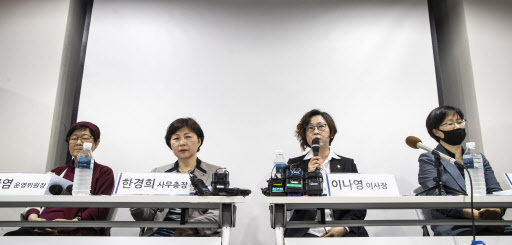
A civic group that advocates for Korean victims of wartime sexual enslavement by Japan on Monday apologized to one of the survivors, who had accused it of not using donations transparently, but denied the accusations.
At a press conference Monday, the Korean Council for Justice and Remembrance for the Issues of Military Sexual Slavery by Japan said the donations were used transparently to support the victims and programs and activities to restore their human rights.
The civic group, which has led weekly rallies demanding an apology and reparations from Japan, was embroiled in controversy after Lee Yong-soo, a 92-year-old victim of Japanese military sexual slavery during Japan’s 1910-45 colonization of the Korean Peninsula, said Thursday that the donations had not been spent on the victims.
Lee, who has been a regular participant in the weekly rallies, also said she will no longer participate in the rallies. Held every Wednesday since 1992 in front of the Japanese Embassy in Seoul, the gatherings have become a symbol of the victims’ fight for justice against the Japanese government as well as the movement against war violence.
“We apologize to (Lee) for causing her emotional pain, which we did not intend,” said Lee Na-young, who leads the civic group, adding they humbly accept disappointment, anxiety and anger Lee expressed.
But the group is not a humanitarian aid organization only aimed at helping the victims lead a stable life, she stressed. It is a women’s rights organization that has led a 30-year-long movement aimed at restoring human rights of the victims of Japan’s sexual slavery.
The civic group’s projects are not limited to delivering donations to the victims, the official said.
According to the group, the donations have been spent on forming a close bond and family-like relationships with the victims by accompanying them to supermarkets and hospitals and so on. They were also spent on financing the victims’ medical treatment and daily necessities, running education, scholarship and research projects, raising international awareness of the issue, filing suits for the victims against the Japanese government, erecting statues symbolizing the victims around the world and holding the weekly rallies.
Out of about 2.2 billion won in donations the group raised for general purposes from 2017-2019, 910 million won, about 41 percent of the total, was spent on supporting the victims, the civic group said.
The donations raised through the weekly rallies -- about 4.5 million won ($3,688) -- in 2019 were spent only to organize the rallies. It cost the group about 110 million won to hold the rallies last year.
The group also denied another allegation that it had pressured the victims not to accept money from the Japanese government under the 2015 deal, which the Park Gyeun-hye administration signed with Japan to settle the issue. The decision was made solely by each victim, it added.
Under the deal, which the two sides called “final and irreversible,” Japan apologized to the victims and provided 1 billion yen ($9.4 million) for a South Korea-run foundation to help the victims.
Some of the victims, including Lee, and the Korean Council, however, have protested the deal, saying it failed to consult with the victims in advance and address their demands. They called for the nullification of the deal and the dissolution of the foundation.
The group also dismissed the allegation that it had been informed of the details of the 2015 deal one day before it was made public. It said it only learned about the deal through media reports.
Lee’s claims came after Yoon Mi-hyang, the civic group’s former president, won a proportional representation seat in the April 15 general elections as a ruling Democratic Party candidate.
The civic group said it believed Lee may have felt sad and disappointed about Yoon, who has fought alongside Lee for nearly three decades, leaving the organization to serve as a lawmaker.
Yoon herself expressed regret and denied the allegations in a Facebook post last week. She did not attend Monday’s press conference.
Historians estimate that up to 200,000 women, mostly from Korea, were recruited and forced to work in front-line brothels for Japanese troops before and during World War II. The majority came from the Korean Peninsula. Only some 19 of the 240 victims registered with the government are still alive.
By Ock Hyun-ju (laeticia.ock@heraldcorp.com)
-
Articles by Ock Hyun-ju






![[KH Explains] How should Korea adjust its trade defenses against Chinese EVs?](http://res.heraldm.com/phpwas/restmb_idxmake.php?idx=644&simg=/content/image/2024/04/15/20240415050562_0.jpg&u=20240415144419)












![[Today’s K-pop] Stray Kids to return soon: report](http://res.heraldm.com/phpwas/restmb_idxmake.php?idx=642&simg=/content/image/2024/04/16/20240416050713_0.jpg&u=)